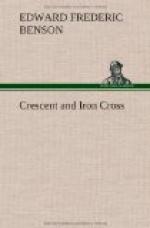Apart from the quiet spade-work that had been going on for some years, Germany made no important move till the moment when, in 1909, the Young Turk party, after the forced abdication of Abdul Hamid, proclaimed the aims and ideals of the new regime. At once Germany saw her opportunity, for here, with her help, might arise the strong Turkey which she desired to see, instead of the weak Turkey which all the other European Powers had been keeping on a lowering diet for so long (desirous only that it should not quite expire), and from that moment she began to lend, or rather let, to Turkey in ever-increasing quantities, the resources of her scientific and her military knowledge. It was in her interests, if Turkey was to be of use to her, that she should educate, and irrigate, and develop the unexploited treasures of human material, of fertility and mineral wealth; and Germany’s gold, her schools, her laboratories were at Turkey’s disposal. But in every case she, as in duty bound to her people, saw that she got very good value for her outlay.
Here, then, was the great psychological moment when Germany instantly moved. The Young Turks proclaimed that they were going to weld the Ottoman Empire into one homogeneous and harmonious whole, and by a piece of brilliant paradoxical reasoning Germany determined that it was she who was going to do it for them. In flat contradiction of the spirit of their manifestoes, which proclaimed the Pan-Turkish ideal, she conceived and began to carry out under their very noses the great new chapter of the Pan-Germanic ideal. And the Young Turks did not know the difference! They mistook that lusty Teutonic changeling for their own new-born Turkish babe, and they nursed and nourished it. Amazingly it throve, and soon it cut its teeth, and one day, when they thought it was asleep, it arose from its cradle a baby no more, but a great Prussian guardsman who shouted, ‘Deutschland ueber Allah!’
Only once was there a check in the growth of the Prussian infant, and that was no more than a childish ailment. For when the Balkan wars broke out the Turkish army was in the transitional stage. Its German tutors had not yet had time to inspire the army with German discipline and tradition; they had only weeded out, so to speak, the old Turkish spirit, the blind obedience to the Ministers of the Shadow of God. The Shadow of God, in fact, in the person of the Sultan, had been dragged out into the light, and his Shadow had grown appreciably less. In consequence there was not at this juncture any cohesion in the army, and it suffered reverse after reverse. But a strong though a curtailed Turkey was more in accordance with Prussian ideas than a weak and sprawling one, and Germany bore the Turkish defeats very valiantly. And that was the only set-back that this Pan-Prussian youngster experienced, and it was no more than an attack of German measles which he very quickly got over. For two or three years German influence wavered, then recovered, ’with blessings on the falling out, that all the more endears.’




